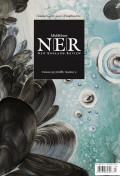In Rome last summer I learned
that there are seven varieties of apricots,
that they are distinguished not only by their physical appearance—the freckles on their skin
or the percentage of it that reddens on the vine—
but also by the month in which they ripen.Damascus, my grandmother’s city, is known
for the apricots of its Ghouta valley,
each name ending in a lingering ee. Baladee—the original, descendant
of the ancients of China and the Korean peninsula.
Or Klaabee—the bitter armeniaca vulgaris,hardy fruit of the eastern steppe.
Or Mawardee—with its flirtatious name
and promise of perfume. That long ee of the possessive claims the apricot
for the country, the animal
wilderness, for water softened with roses.Last summer in Rome, turning
the corner onto Piazza di Santa Maria
the clink of the morning’s last cappuccino glassesand low growls of Vespas on the street
gave no indication of the city I would travel to
a few steps forward. I wasn’t thinking of the jam-colored sunsets of Amman, the stone
fruits and wedding music that filled my grandmother’s garden,
the serrated leaves of her apricot tree. Then a scentdrifted up from the cobblestones. A thickness,
a palpable haze of flesh beginning
to spoil, of sugar turning in sunlight. In Amman, a tree like the one leaning
on a wall in the piazza had reigned over
our childhood, baladee apricots like shattered lanterns aglow at its base, darkening,
gathering droves of ants, the ravenous taking.
Not the perfume of Damascus mawardee nor the silk handkerchief of blossoms,
not the fruit’s citrus kiss. It was the scent of spoiling,
of too much sweetness, that claimed me, long cry at the end of the ballad of old summers.
In Amman, it is known that an apricot harvest
can be ruined by untimely frost and that, like Rome, the city is built on seven hills.
Apricots
Feature Date
- November 10, 2018
Series
Selected By
Share This Poem
Print This Poem
Copyright © 2018 by Lena Khalaf Tuffaha
All rights reserved.
Reproduced by Poetry Daily with permission
Lena Khalaf Tuffaha is an American poet of Palestinian, Syrian, and Jordanian heritage. She is the author of Water & Salt (Red Hen Press, 2017) and Arab in Newsland, winner of the 2016 Two Sylvias Chapbook Prize. She earned her MFA in Poetry at the Rainier Writing Workshop of Pacific Lutheran University. Her poems and essays have been published in Kenyon Review Online, World Literature Today, Alaska Quarterly Review, Black Warrior Review, and Winter Tangerine. This year, she is the inaugural Poet-in-Residence at Open Books: A Poem Emporium, in Seattle.

Volume 39, Number 3 / 2018
Middlebury, Vermont
Middlebury College
Editor
Carolyn Kuebler
Managing Editor
Leslie Sainz
Poetry Editor
Jennifer Chang
By publishing new fiction, poetry, and nonfiction that is both challenging and inviting, New England Review encourages artistic exchange and thought-provoking innovation, providing publishing opportunities for writers at all stages in their careers. The selection of writings in each issue presents a broad spectrum of viewpoints and genres, including traditional and experimental fiction, long and short poems, translations, criticism, letters from abroad, reviews in arts and literature, and rediscoveries. New England Review exists in a place apart from mass culture, where speed and information overload are the norm. At NER, serious writing is given serious attention, from the painstaking selection process through careful editing and publication, where finally the writer’s words meet up with a curious and dedicated readership.
Poetry Daily Depends on You
With your support, we make reading the best contemporary poetry a treasured daily experience. Consider a contribution today.



